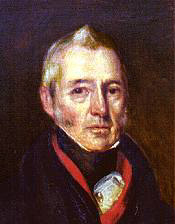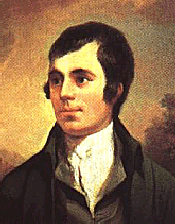ALEXANDER
FINDLATER and ROBERT BURNS

 Alexander
Findlater (1754-1839) became an excise officer and rose to the position of Collector
of Excise for Glasgow. The son of James
Findlater, Office of Excise, he was the friend of Robert Burns. A number of articles
have been written about him because he championed Burns after the poet's death, when
Burns was accused of, in particular, attachment to the bottle.
Alexander
Findlater (1754-1839) became an excise officer and rose to the position of Collector
of Excise for Glasgow. The son of James
Findlater, Office of Excise, he was the friend of Robert Burns. A number of articles
have been written about him because he championed Burns after the poet's death, when
Burns was accused of, in particular, attachment to the bottle.
Findlater joined the Excise
in 1774, was appointed to Perth in 1778 and to Glasgow in 1784. He was appointed
Examiner on 1st June 1790 and in April 1791 became Supervisor at Dumfries. He
went to Edinburgh as General Supervisor in 1797, then to Haddington in 1807.
In 1811 he succeeded William Corbet as Collector at Glasgow, where he remained
until he retired in 1825.
Findlater had recommended
Burns in 1789, when he was trying for a position with the Excise. Thus we find
Burns writing on 28th October 1789 from Ellisland:
Sir
I believe I mentioned something to you yesternight of the character that Mr
Corbet told me you had given of me to our Edinburgh Excise folk, but my conscience
accuses me that I did not make the proper acknowledgement to you for your goodness.
– Most sincerely & gratefully do I thank you, Sir, for this uncommon instance
of kindness & friendship. –
I mean not by
this as if I would propitiate your future inspection of my conduct. – No, Sir;
I trust to act, and I shall act, so as to defy Scrutiny; but I send this as
a sheer tribute of Gratitude to a Gentleman whose goodness has laid me under
very great obligations, and for whose character as a GENTLEMAN I have the highest
esteem. – It may very probably never be in my power to repay, but it is equally
out of my power to forget, the obligations you have laid on,
Sir, your deeply indebted & very humble servant
Robt. Burns
However Findlater
afterwards put a slightly different gloss on the start of their friendship:
'My connection
with Robert Burns commenced immediately after his admission to the Excise, and
continued to the hour of his death. In all that time the superintendence of
his behaviour as an officer of the revenue was a branch of my especial province
and it may be supposed I would not be an inattentive observer of the general
conduct of a man and a poet so celebrated by his countrymen.'
Although Findlater
was not posted to Dumfries as Supervisor until April 1791, their friendship
continued to develop. In February 1790 (if the dating by Ferguson, editor of
Burns’ letters, is correct) there is a note from Burns to Findlater accompanying
some new laid eggs from Ellisland 'All of them couch, not thirty hours out.'
Burns added Findlater to the list of Dumfries people subscribing to Dr Anderson's
magazine The Bee. Yet friendship did not result in any slackening of Findlater's
scrutiny of Burns' work. A letter to Findlater of June 1791, in which Burns
explains himself, shows this clearly enough:
‘I am both much
surprised and vexed at that accident of Lorimer's stock. The last survey I made
prior to Mr Lorimer's going to Edir. I was very particular in my inspection
and the quantity was certainly in his possession as I stated it. The surveys
I have made during his absence might as well have been marked "key absent",
as I never found any body but the lady, who I know is not mistress of keys,
&etc. to know anything of it, and one of the times, it would have rejoiced all
Hell to have seen her so drunk. I have not surveyed there since his return.
I know the gentleman's ways are, like the grace of G-, past all comprehension;
but I shall give the house a severe scrutiny tomorrow morning, and send you
in the naked facts.
I know, Sir, and
regret deeply that this business glances with a malign aspect on my character
as an Officer; but as I am really innocent in the affair, and as the gentleman
is known to be an illicit Dealer, and particularly as this is the single instance
of the least shadow of carelessness or impropriety in my conduct as an Officer.
I shall be peculiarly unfortunate if my character shall fall a sacrifice to
the dark manoeuvres [sic] of a Smuggler.'
The 'Smuggler', incidentally
was the father of Chloris Lorimer of the poems. During the illness of Findlater
for some months from December 1794, Burns was appointed Acting Supervisor in
his place.
Findlater defended Burns' loyalty and efficiency at the inquiry into the charges
of disloyalty levelled against the poet in December 1792, and defended the dead
poet in Alexander Peterkin's edition of 1815 against the calumnies of Heron,
Currie and those who sought to paint Burns in his Dumfries days as a 'hopeless
drunkard'. The Burns Society erected a memorial to him in the North Street Burial
ground in Glasgow.
He married Susanna Forrester dau. of John Forrester of Braes (born 31st December
1749, died 10th March 1810, buried at Greyfriars, Edinburgh.) Her mother
was a Napier of Craigannet and was descended from Napier of Merchiston, the inventor
of logarithms. After Susanna's death, he married Catherine Anderson and had three more children,
from whom there are no known descendants.

 Alexander
Findlater (1754-1839) became an excise officer and rose to the position of Collector
of Excise for Glasgow. The son of James
Findlater, Office of Excise, he was the friend of Robert Burns. A number of articles
have been written about him because he championed Burns after the poet's death, when
Burns was accused of, in particular, attachment to the bottle.
Alexander
Findlater (1754-1839) became an excise officer and rose to the position of Collector
of Excise for Glasgow. The son of James
Findlater, Office of Excise, he was the friend of Robert Burns. A number of articles
have been written about him because he championed Burns after the poet's death, when
Burns was accused of, in particular, attachment to the bottle.